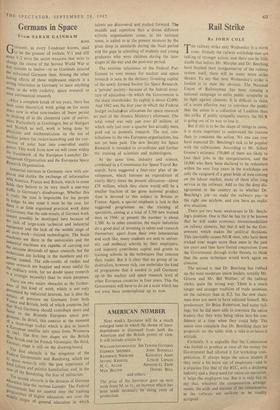Rail Strike
By JOHN COLE THE railway strike next Wednesday is a storm cone. Already the railway workshop men are talking of stronger action, and there can be little doubt that before Mr. Marples and Dr. Beeching have finished their reorganisation of the railway system itself, there will be many more strike threats. To say that next Wednesday's strike is foolish is to state the obvious. The National Union of Railwaymen has been running a national campaign to enlist public sympathy in its fight against closures. It is difficult to think of a more effective way to convince the public that the union is a collection of Luddites than this strike. If public sympathy matters, the NUR is going out of its way to lose it.
But if this is to be the shape of things to come, it is more important to understand the reasons than to condemn the action. No one can ever have expected Dr. Beeching's task to be popular with the railwaymen. According to Mr. Sidney Greene's estimate, 150,000 of them are likely to lose their jobs in the reorganisation, and the 18,000 who have been declared to be redundant within the next four years in the workshops are only the vanguard of a great body of men coming on the labour market, many of them after long service in the railways. Add to this the deep dis- agreement in the country as to whether Dr. Beeching's job—to make the railways pay—is the right one anyhow, and you have an explo- sive situation.
There are two basic weaknesses in Dr. Beech- ing's position. One is that he has let it be known that he will make economic recommendations on railway closures, but that it will be the Gov- ernment which makes the political decisions. This inevitably causes NUR men, who have been tricked over wages more than once in the past ten years and then have forced concessions from the Government through strike threats, to think that the same technique would work again on closures.
The second is that Dr. Beeching has rubbed up the most moderate union leaders, notably Mr. Greene and Mr. Bill Webber, of the railway clerks, quite the wrong way. There is a much longer and stronger tradition of trade unionism on the railways than in ICI, but the new chair- man does not seem to have adjusted himself. His predecessor, Sir Brian Robertson, had many fail- ings, but he did seem able to convince the union leaders that they were being taken into his con- fidence at a time when they could help. The union men complain that Dr. Beeching slaps his proposals on the table with a take-it-or-leave-it attitude.
Certainly, it is arguable that the Commission was foolish to produce at once all the money the Government had allotted it for workshop com- pensation. It always helps the union leaders if they twist a bit more out of employers—and in a situation like that of the BTC, with a declining industry and a sharp need for union co-operation, it helps the employers too. But it is only fair to say that, whatever the compensation arrange- ments, the scale and manner of the redundancies in the railways are unlikely to be readily accepted.


































 Previous page
Previous page